Putin’s Big Economic Conference Is a Big Deal This Year
The St. Petersburg International Economic Forum was the largest ever, with 17,000 guests, including Emmanuel Macron of France, Shinzo Abe of Japan, Wang Quishan of China and IMF General Director Christine Lagarde.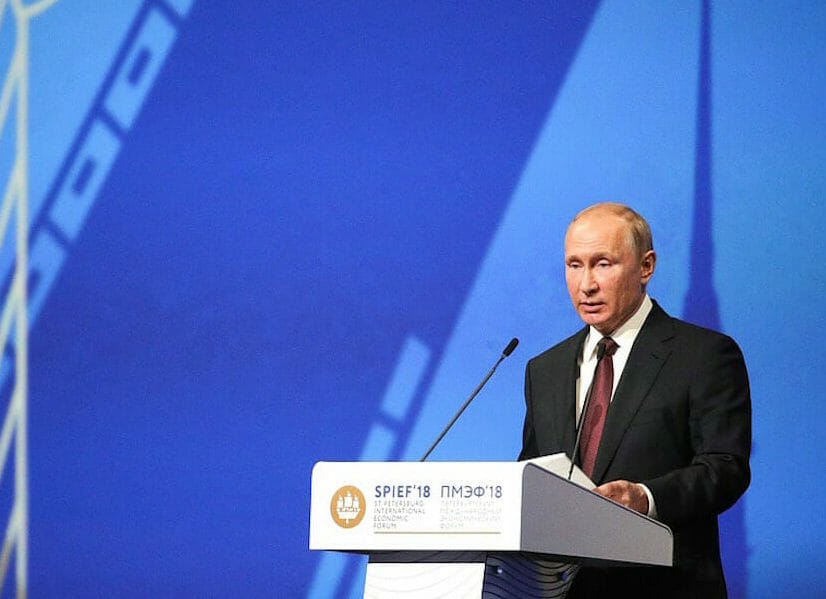 Russian President Vladimir Putin at the 2018 St. Petersburg International Economic Forum. (Kremlin)
Russian President Vladimir Putin at the 2018 St. Petersburg International Economic Forum. (Kremlin)
This year’s 22nd edition of the St. Petersburg International Economic Forum was the largest ever, numbering 17,000 guests by the last tally. Among them were corporate CEOs and chairmen of the world’s largest companies, the top leaders of less famous multinational corporations, as well as of medium and small enterprises.
They came within national business delegations from around the globe led by senior government officials. There were sector and national round tables at which they met with their Russian counterparts. There were grand signing ceremonies for some of the 500 contracts and agreements concluded at the Forum, which had a combined value of 2.365 trillion rubles, or about 30 billion euros.
If we shift our consideration from protocol rankings to political bellwethers, there is no question that the man to watch from his arrival in St Petersburg on Thursday, 24 May through his departure on Friday evening the 25th was Emmanuel Macron. The close working relationship with Russia of the leaders of China and of Japan has developed incrementally over the past couple of decades, in the first case, and over the past several years in the second case.
Therefore, in this essay, I will begin with a close examination of what Macron said in his two major addresses and what he may have achieved in negotiations with Vladimir Putin. We will then consider what the other featured guest of the Forum, Shinzo Abe, said, which contrasts sharply with Macron’s positions.
Emmanuel Macron presents a “sovereign” France with an “independent foreign policy”
Emmanuel Macron’s statements both at the press conference in the Constantine Palace on the 24th following his tête-à-tête talks with Vladimir Putin and at the Plenary Session of the Forum on the 25th oblige me to revise and refine my two previous appreciations of who he is and what he can achieve dating from the days immediately following his election a year ago and from his speech to the joint session of Congress in the USA a month or so ago.
To be specific, it now appears that Macron is delivering a strong, not the weak France on the international stage that I had supposed. It further appears that whatever assistance he may have received in his electoral campaign from the US intelligence services, and however much he has justified their wager on him as a committed globalist and as a person unlikely to relax sanctions on Russia anytime soon, he is a more complex personality, with greater ambition and greater determination to write his own roadmaps than they assumed. This affects his relations with Vladimir Putin in ways no one in Washington could foresee.
Every edition of the Forum has a theme or leitmotiv that is supposed to guide the addresses of the keynote speakers and the agendas of the round tables and working groups. This year the theme was “Building an Economy of Trust.” Of all Plenary Session speakers, apart from Vladimir Putin, who was after all the host and surely the author of the leitmotiv, Macron was the most focused on this topic, which he chose to approach from an unusual angle but one highly relevant to the thinking of his hosts: that the precondition for “trust” between nations building a shared global economy is national self-confidence and the assertion of national sovereignty.
We will explore this in a moment. But first I consider it important to go back a year to the days immediately after his assuming office as president when Emmanuel Macron invited Vladimir Putin to their first summit meeting. What Macron said then bears directly on what he has said these past few days in St Petersburg.
The pretext or rationale for inviting Putin to Versailles in May 2017 was to jointly commemorate the three hundredth anniversary of the visit to Paris by Peter the Great. In his speech at the joint press conference held in Versailles, Macron exhibited thinking processes which are evidently deep-set since they recur in his major addresses, such as before the joint session of Congress a month ago and during his speech at the press conference in the Constantine Palace, Petersburg on Thursday: namely a highly intellectual approach that searches out affinities with the country he is dealing with in their historical interconnections and shared cultural experiences going back centuries.
As he said on May 29, 2017:
Dialogue between France and Russia has never ceased since [1717] – a dialogue between our intellectuals, between our cultures sowed the roots of relationship that has endured to this day.
One other quote from his speech on that day is also worth repeating: “History is greater than us.” In the given context, the modesty implied by that statement is misleading. As we shall see, Macron uses history as a cloak of personal grandeur; he envisions himself as an historic personage, an agent of History, following in the footsteps of none other than Charles De Gaulle.
Macron’s interest in history does not mean that his reading is fastidious. In his speech to the U.S. Congress, he said that the United States and France fought World War I to defeat imperialism, which is utter nonsense. At the Versailles speech a year ago, he spoke of Peter the Great’s visit as a start of French-Russian relations. Putin, who must have known what was coming, reminded him that French-Russian relations could be traced back to the 11th century, when the daughter of Yaroslav the Wise, Grand Prince of Kiev and Prince of Novgorod gave his daughter Anne to the French king Henry I, so that the French royal line of Valois carried Russian genes for centuries.
At the end of the day, the Putin-Macron meeting a year ago may not have done much to improve trade relations or to resolve international conflicts including in Syria and Ukraine, but it did result in the launch what is now called the “Trianon Dialogue” which has as its mission to bring together thinkers, intellectuals, young people in exchanges that are expected to foster greater mutual understanding between French and Russian civil society. Though from his own short speech at Versailles, Putin was clearly more interested in trade figures, he went along with Macron’s initiative and invited him to a return visit, specifically to Moscow.
Who may have influenced the change in venue to St Petersburg is not clear. But both sides had much to gain. For Vladimir Putin, bringing Macron into the annual St Petersburg Economic Forum would be a great catch, raising by far the international visibility and interest of the event. And Macron could be delighted with the opportunity to indulge his passion for history by meeting Vladimir Putin for their private talks ahead of the Forum at the Constantine Palace originally built for Peter in the suburbs of the Northern Capital, replete with extensive gardens laid out in the French manner of Versailles.
The Russians needed no prompting to provide an historical setting worthy of their meeting quite apart from the Forum. They arranged a gala performance of the ballet Raymonda in the Mariinsky Theater on Thursday evening, 24 May to commemorate the 200th anniversary of the birth of the great French-Russian choreographer Marius Petipa. The Marseilles-born Petipa was the author of the principal classical ballets that established the renown of the Russian imperial theaters in the last decade of the 19th century and are performed worldwide to this day. In another overlay of symbolism, the selected ballet just happens to deal with the uneasy relations of Christian (French and Hungarian) West and Saracen East played out at the level of their respective nobility.
The first of Emmanuel Macron’s two addresses during his visit to St Petersburg was at a press conference presenting the results of the private meetings of two presidents. It was delayed by two hours, given that their meeting lasted twice as long as planned and ended in key understandings on Syria and Iran that I will describe in a moment.
In fact the event resembled more an appearance before the joint session of Congress than a normal press conference. It was long on speeches and short on question time for journalists. And the audience consisted heavily of Russian ministers and leading members of the two houses of the Russian legislature. This is because in parallel with the meeting of presidents there were meetings of officials from the two governments discussing in particular the progress and future development of the Trianon Dialogues, with its people-to-people component.
Vladimir Putin’s introductory speech was relatively short. He said that they had discussed at length global issues, then he moved quickly to the issues that are close to his heart and to the Forum the next day: the economic relations between France and Russia, their bilateral trade and investment.
Putin characterized the talks as “business like” and held in “an atmosphere of openness.” In diplomatic code, this means that there were real differences in views on many points. Nonetheless, they reached agreement on coordination of efforts in Syria and over saving the Iran nuclear deal. Progress was made in a wholly new area: working together to regulate cyber space.
Emmanuel Macron may have been a Rothschild banker before moving into government but his speech at the Constantine Palace, on the day before an economic forum, was focused not on business and economics but on France’s international status as a world power with an identity quite apart from its membership in the European Union.
In effect, Macron’s programmatic statement was a well-considered response to Vladimir Putin’s insistence over the years that Russia is one of the very few genuinely sovereign nations in the world, whereas others, including the member states of the European Union are vassals of the United States with whom one cannot successfully negotiate anything of primary importance.
Macron said loudly and clearly that as a Permanent Member of the UN Security Council France has the authority and the obligation to exercise its sovereignty and pursue an independent foreign policy. And in a very clever association with the leitmotiv of the Economic Forum, he explained that trust between nations necessary to build the global economy is possible only when nations are self-confident and assert their sovereignty.
Direct quotation here is worth the time:
France and Russia occupy a special place in relations as permanent members of the UN Security Council. We are obliged to defend grand multilateralism. We are obliged to maintain a permanent and independent dialogue.
As President Putin knows, the foreign policy of France under my direction is completely independent…We make our decision by ourselves and for ourselves. We believe in Europe to multiply the force…We take into account the interests of our partners. And our dialogue with Russia is an element of this independence…We speak to everyone. We do this frankly and directly, and this is the mark of our trustworthiness. …We must defend our collective security, defend our values everywhere, and must respect the sovereignty of the people….I respect the enhanced role which Russia assumes in its regional environment and in the world, in particular in the Middle, which entails heightened responsibility…..I hope Russia understands that France is its credible European partner, now and in the future. Our talks have been held in this sense.
These curious but valid formulations were meant to catch the attention of his hosts, which they surely did. But they also constituted a major claim by Macron addressed over the heads of those in the hall to the home audience in the European Union. Macron was unmistakably setting out his claim to take over the mantle of leadership of foreign policy in the EU that has been held unchallenged by Germany for the last six years due to the weak and witless government of François Hollande. Germany is not a member of the Security Council. Germany is essentially an occupied country given the large presence of US bases on its territory. And Angela Merkel would never say that Germany has a foreign policy of its own. For Merkel, only the EU can have a foreign policy, which she quietly manages from behind the scenes through her minions, the likes of Donald Tusk and Jean-Claude Juncker.
In fact, Macron’s vision of French leadership also has a military component, where, again, his country puts Germany to shame, raising questions about who should truly call the shots on European foreign policy. This came out on the second day of his visit during the Plenary Session, when Vladimir Putin playfully took up a remark by Macron that Europe has obligations to the United States in return for its securing the defense. Said Putin, teasingly: “Emmanuel, don’t worry, we are ready to help you with security.” Macron was taken aback by the Russian’s wit, but found his response: “We, France, have our own army to look after our security.” Germany, as we all know, does not have an army worthy of the name.
Otherwise, Macron’s speech included a large section devoted to historical patterns and continuities binding France and Russia together. It is more than curious that Macron chose to highlight the fact that when his predecessor Charles Charles De Gaulle decided to visit Russia in June 1966 he chose St Petersburg (Leningrad at the time) because of the city’s heroic resistance in the great siege of World War II. Macron announced that he would be visiting the Piskarevo cemetery where more than a million unidentified victims of the siege are buried to lay a wreath of remembrance.
Mention of his following in the footsteps of De Gaulle during this speech in Petersburg aligns perfectly with his mentioning one month ago in Washington De Gaulle’s address to the joint session of Congress in 1967, an honor that had been granted to no other French head of state in the intervening 51 years. It is remarkable that Macron, who started his government career as a Socialist and served under Hollande, has chosen De Gaulle, the iconic figure of the French Center Right, to be his avatar. The common denominator is surely national sovereignty, which De Gaulle went very far to promote.
Otherwise, Macron’s talk on continuities relied heavily on mutual cultural influences between Russia and France. Russian schoolchildren grow up with The Three Musketeers, he said. French schoolchildren grow up with Peter and the Wolf. But he went well beyond these commonplaces. He noted that French tourists traveling by boat down the Volga are known to ask where is the building that Dumas, the author of The Three Musketeers, stayed in during his sojourn in Russia. And the bottom line of all these evocations of common cultural traditions was Macron’s overriding point that the countries are both European. Indeed, Macron’s explanation to journalists of his mission to Russia in separate interviews on the sidelines was to ensure that the country did not turn in upon itself or abandon Europe for its friends in Asia.
To anyone with a good knowledge of Vladimir Putin, that is a wholly artificial risk. But so be it, it reads well in Paris or Brussels. In any case, one of the concrete results of the discussions in the Constantine Palace was an initiative to drop all visa requirements for young people of both countries below age 18 who wish to visit the other country. If implemented, this will be a very important step forward in normalizing relations and preparing the grounds for mutual understanding.
For a Rothschild banker and for a participant in an Economic Forum, Macron’s preparation of remarks on the economy and trade relations was far weaker than his historical and cultural research. He was pleased to remind the audience that France is the largest foreign employer in the Russian Federation, which may well be a function of its particular activity in service industries including retailing (Auchan, Decathlon, Castorama), hospitality (Novotel) and banking (Société Générale-Rosbank) which employ large work forces as opposed to manufacturing industry. He boasted that notwithstanding the difficult times, meaning sanctions which France has supported and enforced, the 500 French companies active in Russia have stayed in place. He avoided entirely the question of trade turnover, which is only a fraction of that between Germany and Russia. He claimed that France is the second largest foreign investor in Russia, but here he was later corrected by Putin, who noted that first place is held by China, after which comes Germany. Putin went on to say that French investment has to be weighed in context: all French companies together have invested 15 billion euros while one Finnish company alone, Fortum, has invested 6 billion euros.
Despite all of the independence that Macron insisted is enjoyed by French foreign policy, in the key issue for his hosts of sanctions, the French President laid down the hard EU line: that no progress on sanctions is possible before progress is made on implementing the Minsk Accords on the Donbass. However, on other international issues where his hands are not bound by EU policy, Macron obviously showed flexibility and a keen interest in arriving at understandings with Putin. The following points of agreement which he laid out are worthy of note:
1. Iran Macron re-stated the commitment of the 3 European signatories of the nuclear accord to remain in the Agreement, despite the withdrawal of the United States. Here their interests coincide with Russia’s. Macron made reference to the decision the week before at the European Summit in Sofia to activate mechanisms that will protect the Agreement and also European companies from extraterritorial application of the American law on sanctions. In answer to questions from reporters on both days of his visit, Macron explained that compensation against losses imposed the US applied only to companies which are not quoted on US exchanges or otherwise heavily invested in US operations which might be shut down. That would entail unacceptable expenses for the European taxpayers. Accordingly such very large companies will decide for themselves on how to respond to US sanctions while small and medium sized companies could be protected. It remains to be seen whether this approach will be sufficient to ensure that Iran continues to benefit commercially from the Agreement in a way that justifies its continued participation.
Macron noted that he and Vladimir Putin discussed the other issues surrounding Iran that Trump had raised to justify US withdrawal: namely Iran’s regional activities, its nuclear course after 2025 and its ballistic missile program. He said he has introduced these questions directly to Iranian prime minister Rouhani and assumes they are discussable on condition that all sides continue to observe the nuclear deal as concluded in 2015.
2. Syria
There is potential importance to the agreement Macron reached with Putin to put in place a coordination mechanism to arrive at a common agenda for the two current formats on a political solution in Syria with the objective of arriving at convergence. These are the Astana format overseen by Russia, Turkey and Iran, and the so-called “Small Group” initiated by the French and including the UK, Germany, Jordan, the United States and Saudi Arabia. The two groups both claim to seek an outcome that preserves the territorial integrity and sovereignty of Syria while not imposing solutions from the outside with respect to the future role of Bashar Assad. The main difference in approaches would appear to be which Syrians will participate in the political solution. The Astana process embraces only the Syrian forces and movements on the ground in the country today. The “Small Group” promotes also the Syrian population that has fled abroad. It will be an enormous challenge to finesse these differences, but better to start now.
Macron also used the opportunity to announce the start of French participation in humanitarian assistance for Syria. So far, the number he put out, 50 million euros, is just a drop in the bucket of the tens if not hundreds of billions needed to restore Syria to its situation before the civil war. But it is noteworthy that France’s funding of NGOs for humanitarian work will also include those operating on territory under the control of Damascus.
During the questioning on the first day of his visit, Emmanuel Macron confirmed that he would be acting on the wishes of his French intellectual supporters and meet representatives of Russian civil society working for human rights. Indeed, on that same day he met with the director of the iconic human rights organization Memorial. But he spent more time with the widow of the great dissident Alexander Solzhenitsyn, whom he invited to the gala ballet performance that evening.
The selection of Natalya for the purpose of talking with society is particularly significant because dissident that he had been before his exile and critical of modern Russia as he had become upon his return to his homeland, Solzhenitsyn was ultimately a sincere admirer of Vladimir Putin. The Russian president has met several times with Natalya Solzhenitsyn in recent years to discuss the use of her husband’s writings in Russian secondary schools among other issues. If this is what constitutes staying in touch with the Russian people as distinct from the Russian government, then Macron is performing it with sensitivity and realism, meaning that he is getting good advice, better than ever came the way of Barack Obama or of his ambassador Michael McFaul.
Of the four guest speakers at the Forum’s Plenary Session on Friday, Emmanuel Macron’s was by far the longest. There were no new directions in his speech compared to his address to the press conference on Thursday. He emphasized repeatedly his keen interest in maintaining an ongoing dialogue with Vladimir Putin and with Russia even if their respective positions were in contradiction.
He invoked once again the historic bonds between the countries in the cultural sphere. And he made an interesting detour into literature, specifically into Tolstoy’s War and Peace, with references to the meeting and exchanges of views between one of the novel’s main characters, Pierre Bezukhov, a complex personality who is widely taken to be a stand-in for Tolstoy himself, and the peasant Platon Karataev, a figure who makes a brief appearance and is the spokesman for Russian folk wisdom. Macron’s attraction to their philosophical dialogues is indicative of how strongly his own studies in philosophy in college shaped his intellectual interests to this day, as a complement to his work in finance and in government. One can be sure that none of this escaped the attention of his hosts, all the more so that Macron can keep straight the characters and the titles of Russian novels, unlike the Russophobe British Foreign Minister Boris Johnson, for example. In this regard, Macron fits into the intellectual world of Vladimir Putin and Russian elites far better than he does in the casino culture world of Donald Trump.
Shinzo Abe: Japan’s regression to US vassal spoils chances for the much-desired peace treaty
Whereas Macron and France emerge from his visit to the Forum with potentially important progress in cooperation with Russia on two of the most important international security issues of the day, the timidity and lack of imagination which Shinzo Abe exhibited at the Forum and in his follow-on visit to the Kremlin for talks on Saturday render utterly unrealizable his hopes to reach a peace treaty with Russia more than 70 years after the end of WWII.
All of this was so precisely because Abe, unlike Macron, has gone backwards rather than forward and is pursuing a foreign policy heavily dependent on the United States. Macron was pushed to evoke French national interest and to oppose the US withdrawal from the Iran nuclear deal because of the security risks failure of the Agreement poses to France and Europe. At the same time he had to scramble to find solutions to the likely threat of US sanctions against French and European companies which may persist in trading with Iran after the imposition of the US embargo. And his thinking was further defined by the trade war on Europe that Trump has threatened to unleash with imposition of tariffs on aluminum and steel, pending a fundamental review of terms of trade between the EU and the USA more favorable to the latter. As Macron’s Minister of Foreign Affairs had said with undiplomatic clarity, Europe refused to negotiate trade terms when being held hostage over steel tariffs.
Meanwhile, the crisis over the growing nuclear and missile delivery systems of North Korea has driven Abe in the opposite direction: straight into the waiting arms of the US administration as he pleads for more, not less protection from US weapons systems and personnel against a perceived threat from Pyongyang.
In his speeches to the Forum and at the press conference following his talks with Putin in Moscow, Prime Minister Abe noted that this is his 21st meeting with Putin and that the issue of a peace treaty remains high on the agenda. However, his determination to arrive at a peace treaty by first conditioning Japanese and Russian publics to the benefits from their joint cooperation through concrete deeds has not gone beyond his 8 identified areas of cooperation.
These projects to raise Russian labor productivity, improve health care and so extend the average life expectancy, all have relatively low budgets and low visibility. The additional joint cooperation over humanitarian measures facilitating visits of Japanese citizens to the Kuriles to visit the graves of their ancestors and projects to jointly improve housekeeping on the islands, including better waste disposal – are all still smaller, one might say insignificant steps.
In answer to a question from a Russian CEO already in business cooperation with Japanese partners on when Japan will raise the funding of an investment fund from its present one billion dollar level to something more in keeping with real demand, Abe made clear that absent a peace treaty he has no intention to allocate large sums of money to Russian projects.
At the end of last year, as the project to build the Crimean Bridge was entering its final phase, there was considerable speculation in the Russian media that early in the new year 2018 an announcement would be made that the redoubtable bridge-building team assembled by Putin’s business ally Arkady Rotenberg for the Crimean Bridge would next be given a contract for rail bridge to connect Sakhalin Island with the mainland in the West and that agreement would be reached with Tokyo on an additional rail bridge connecting Sakhalin with the Japanese island of Hokkaido to the East. This vast project, it was said, could alter logistics of Japanese trade with Western Europe in a dramatic manner. It could capture the imagination of the Russian and Japanese peoples for a generation. In short, it could prepare the way for the hoped for peace treaty.
However, Shinzo Abe made no suggestion during his latest visit to Russia that his government is giving any thought to such a major joint infrastructure project with Russia, one which surely would not be welcomed by his American friends since it would work against the sea power that the US considers its own ace at the card table.
Shinzo Abe’s ambition for a peace treaty to be concluded with Russia during the time in power of his generation is entirely empty so long as he is unable to say what Emmanuel Macron said at the Forum: that he heads a sovereign country which has its own independent foreign policy.
There are many observers who shrug their shoulders and cannot comprehend why Russia, the world’s largest nation by far, with more than 10% of the world’s land mass, is unwilling to hand over four small islands to Japan which it took over under the terms of an agreement among the WWII Allies to bring Russia into the war in the Pacific in its final phase. However, it is not land greed or even concern over losing sovereignty over the related mineral rights for hydrocarbons on the bottom of the sea surrounding those islands.
For Russia, the sticking point is the security consideration of allowing these territories with their important location in the sea lanes giving the Russian navy access to the wider Pacific coming under possible control of the United States occupation forces in Japan. For Russia, Abe is an undependable partner precisely because he is not a sovereign party but subject to decisions taken in Washington.
The Japanese government’s reticence to invest in trade facilitation with Russia has results. As Vladimir Putin noted, bilateral Russian-Japanese trade falls far short of its potential. In the last year it came to just 15 billion dollars, and already fell behind Russian-South Korean trade figures, while Russian-German trade stood at 50 billion and Russian-Chinese trade reached 80 billion.
Your support is crucial…With an uncertain future and a new administration casting doubt on press freedoms, the danger is clear: The truth is at risk.
Now is the time to give. Your tax-deductible support allows us to dig deeper, delivering fearless investigative reporting and analysis that exposes what’s really happening — without compromise.
Stand with our courageous journalists. Donate today to protect a free press, uphold democracy and unearth untold stories.

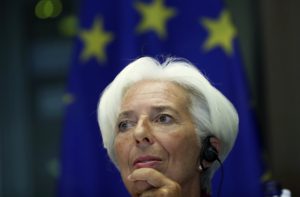
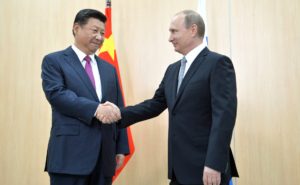
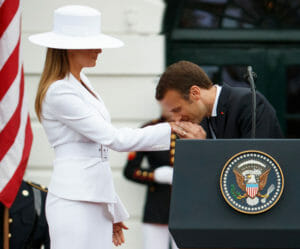
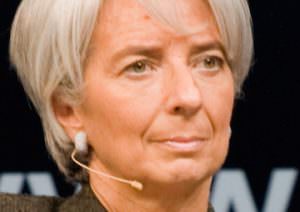
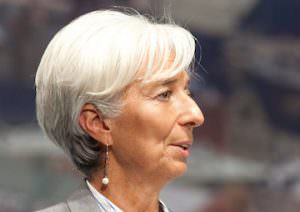


You need to be a supporter to comment.
There are currently no responses to this article.
Be the first to respond.